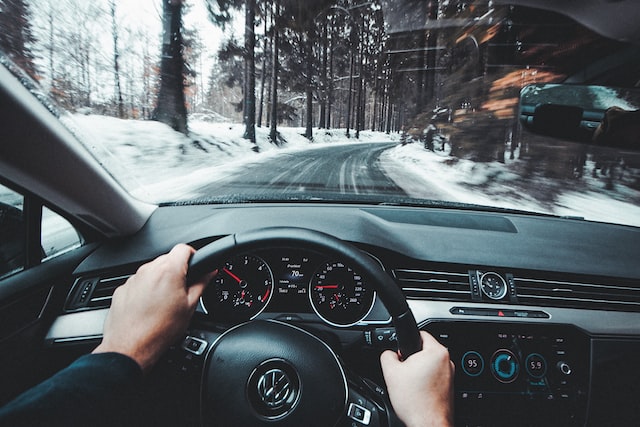
Cargroot is reader-supported. When you buy through links on our site, we may earn an affiliate commission.
Have you ever heard that loud clicking sound from the engine when pressing the gas pedal? It might be a sign that something is wrong with your car. This noise happens when you drive straight and press down on the gas pedal. There could be various reasons behind this. This article will look at the reasons you hear a loud clicking noise when driving.
Why Does My Car Make Loud Clicking Noise When Driving Straight?
Damaged CV Joint
If your CV joint is damaged, it could make a loud clicking noise when you drive straight. This is caused by metal fatigue in the CV joint. Metal fatigue happens when metals are overheated or put under excessive stress. This can lead to cracks in metal parts, which can eventually cause them to break apart.
The click that occurs when driving straight is when one side of the CV joint breaks away from the other side. This can cause problems with your car’s performance – especially if it happens while you’re driving on uneven roads or at high speeds!
Damaged Steering Column Component
The steering column is responsible for turning the wheels. It comprises many parts, including the shaft and rod that connect the wheels to the axle. The shaft can be replaced if damaged or worn out, but replacing the steering column will cost more than repairing just one part.
If you hear a loud clicking noise when you turn your steering wheel, it means that one of the components of your steering column has been damaged or worn out. It would help if you got your car checked by a professional immediately.
Loose Lug Nuts
Loose lug nuts could also make a loud clicking noise when driving straight. The noise is similar to that of a tire rolling over a curb or pothole. It is caused by metal-against-metal contact and can be heard by other drivers. The problem occurs when the lug nuts are not fully tight enough and have become loose. When this happens, they may hit the rim itself or each other, causing them to loosen.
Dirty or Low Engine Oil
Engine oil is a critical component of your car’s internal combustion engine. Without it, your car would lose its ability to run and would be unable to move.
When you take your car in for regular service, the technician will check the engine’s oil level. If the oil level is not right, you’ll hear a loud clicking noise when you start your car or put it in drive mode.
Is It Safe to Drive A Car with Bad CV Joints?
It’s not safe to drive a car with bad CV joints. CV joints are the rotors that connect the transmission to the engine. If a CV joint is worn out or damaged, it can cause uneven tire wear, which results in poor gas mileage and increased wear on the vehicle’s drivetrain components.
A worn CV joint can also result in severe drivability issues, such as jerking or stalling while driving at high speeds.
How Long Can CV Joints Survive Once They Start Making Noise?
In most cases, CV joints can survive for a long time without making any noise. They’re designed to withstand high loads, so they’re unlikely to break down under normal circumstances. However, if you notice some noise coming from your CV joint, you should have it checked out by a professional.
It’s also important to remember that CV joints only last about ten years before showing signs of wear and tear. If you have an older vehicle with a CV joint that is starting to make noise, be sure to have it repaired soon so that you don’t damage your car’s suspension system or transmission by neglecting repairs when needed most.
Should You Continue Driving if Your Car Is Making Loud Clicking Sounds?
If you’ve been hearing loud clicking sounds from your car, it’s best to get it checked out by a professional as soon as possible. Clicking noises are typically caused by an underlying problem and can indicate other issues that may be causing your car to act up.
If you continue driving with the clicking noise present, it could lead to more significant problems down the road. For example, if there is any sign of corrosion on your AC system or in the cooling lines of your engine block (which can cause many issues), then continuing to drive with these issues could result in an expensive repair job or even more damage to your vehicle.
What Are the Signs That Your Car Transmission Is Going Bad?
One of the most common signs that your transmission is going bad is when you notice a clicking sound from the engine. This means that you need to get your transmission checked out right away. You can also check for other signs of transmission problems by watching out for the following:
- Your car shifting hard or not at all
- The car jerking forward when you are trying to stop quickly
- The car is not starting at all (this indicates an internal problem)
Conclusion
If your car is making loud clicking noises, don’t ignore them. If not taken care of properly, the bearing could seize and cause significant damage to your engine. You can save yourself a big headache (and expense) by having it checked out sooner rather than later.



![[Solved] Car Shaking in Reverse – Why & How to Fix It?](https://cargroot.com/wp-content/uploads/2023/03/giorgio-trovato-gBF0CCP_Qy0-unsplash-100x70.jpg)


